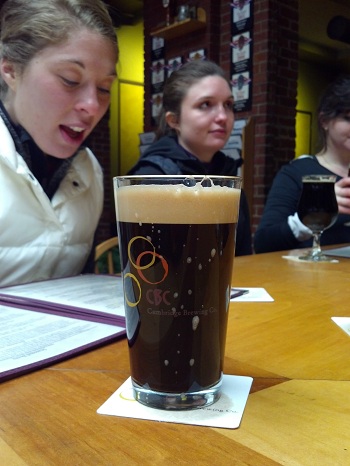Support For A Worthy Cause

Brewery and Country of Origin: Cambridge Brewing Company of 1 Kendall Square, #100, Cambridge, MA, 02139, USA
Date Reviewed: 2-22-13
Today, most beer you would enjoy is filtered, sometimes pasteurised, carbonated/nitrogenated, and fermented once. And if you're at a bar, it will most certainly come from a keg. These aren't necessarily bad things, as long as the beer's quality is kept to standards. Though today, a growing population of beer enthusiasts are upset with the way things are going in the brewing industry. As the second half of the 20th century brought the world of beer multinationals, consolidation, and macrobreweries, the practice of brewing was transformed from small batch, time consuming, and expensive methods to mass production, heavy distribution, and cost effective models. From a business standpoint, it all made sense. Brew more, cost less, make money. But beer drinkers didn't see any glory in it. And until the advent of real commercial craft brewing, global quality of beer was on the decline. This degradation of brewing inspired the formation of the Campaign For Real Ale (CAMRA), currently the largest single issue consumer group in The UK. The group and its members promote a growing diversity in the craft and small scale brewing industry, increasing overall appreciation for traditional and less popular beer styles (such as Stouts, ciders, and Mild beers), protecting and improving consumers' rights, and of course, promoting high quality beers which offer value for the money. The group also aims to make the pub a more centric location for community life, as well as lowering taxes for the industry as a whole. As of 2013, the group, which was founded by four beer lovers in 1971, has grown to over 147,000 members and continues to witness rapid growth. Its headquarters are in the city of St. Albans, in Hertfordshire, England. Standard membership is £23 a year and is open to anyone over the age of 21. Normally, we're not terribly interested in organizations like these because like most humans, we get tired of politics, but we couldn't help but notice the good work that CAMRA is doing for the beer drinkers' world. That said, the United States needs a group like this. Perhaps we'll start it one day. Who knows. Either way, this porter is a dry hopped variation of the Cambridge Brewing Company's mainstay porter, an annual offering. This cask version is only available on a rotational basis, but boy, if you find yourself in Cambridge with the option of trying it, do yourself a favor.
Date Sampled: 2-03-13 At: Cambridge Brewing Company, 1 Kendall Square, #100, Cambridge, MA, 02139, USA
Beer Style: American Porter
Alcohol by Volume: 6.00%
Serving Type: Brewery Cask Keg, 20 oz Tumbler Glass
Rating: 4.27
 Dry Hopped Cask Porter
Dry Hopped Cask Porter




